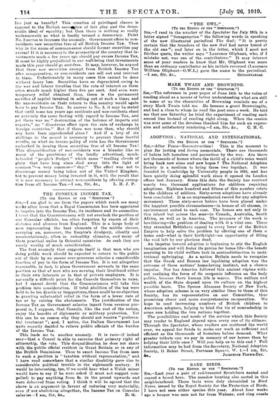ADOPTION: NATIONAL AND INTERNATIONAL.
(TO THE EDITOR OF THE "SPECTATOR."]
Sia,—After Peace—Reconstruction! This is the moment to plan for lasting and living memorials. There are thousands of babies left homeless and parentless by the war. Are there not thousands of homes where the thrill of a child's voice would bring back new aims and new hopes ? The National Adoption Society is a medium to bring these two together. It was founded in Cambridge by University people in 1916, and has been quietly doing splendid work since it opened its London offices last January. Sines this date the Society has received nearly two thousand applications for children requiring adoptions. Eighteen hundred and fifteen of this number relate to the children of soldiers. Sixty-seven adoptions have already been concluded. It is an unpreoedented record for any adoption movement. These sixty-seven babies have been placed under the happiest possible circumstances—in homes of all classes, in environment suited to each case. The homes are not only in this island but across the seas—in Canada, Australia, South Africa, as well as in America. The pressure of the work is bewildering—the problem of dealing with it a vital one. These tiny stranded Britishers appeal to every lover of the British Empire to help solve the problem by offering one of them a home and—what is their birthright—an opportunity of filling the void left by our glorious dead.
An impetus toward adoption is beginning to stir the English imagination and will foster its genius for home life—the benefit accruing to Its child welfare task in contradistinction to insti- tutional upbringing. As a nation Britain needs to recognize that the Greek and Roman law legalizing adoption was the outcome of those nations' home-loving instinct, not a chance impulse. Nor has America followed this ancient regime with- out realizing the force of its economic influence on the body politic, because there human life is scarce. The welfare and wealth of the State depend upon its culture on the highest possible basis. The Spence Alumnae Society of New York, whose adoption scheme is on very similar lines to those of this Society, has its representative on our Committee, thus promising closer and more comprehensive co-operation. We hope to send increasing numbers of British children to American adopters, helping to bind the tie of comradeship in arms now holding the two nations together.
The possibilities and needs of the service which this Society may render to England depend upon every one of its citizens. Through the Spectator, whose readers are scattered the world over, we appeal for funds to make our work as sufficient and efficient as the thousands of homeless babies demand. What greater tribute can we pay in memory of our heroes than by helping their little ones ? Will you help us to this end ? Full information may be had from the Secretary, National Adoption Society, 11 Baker Street, Portman Square, W. 1.—I am, Sir,
J05E1'111E11 PLOWS-DAT.


































 Previous page
Previous page